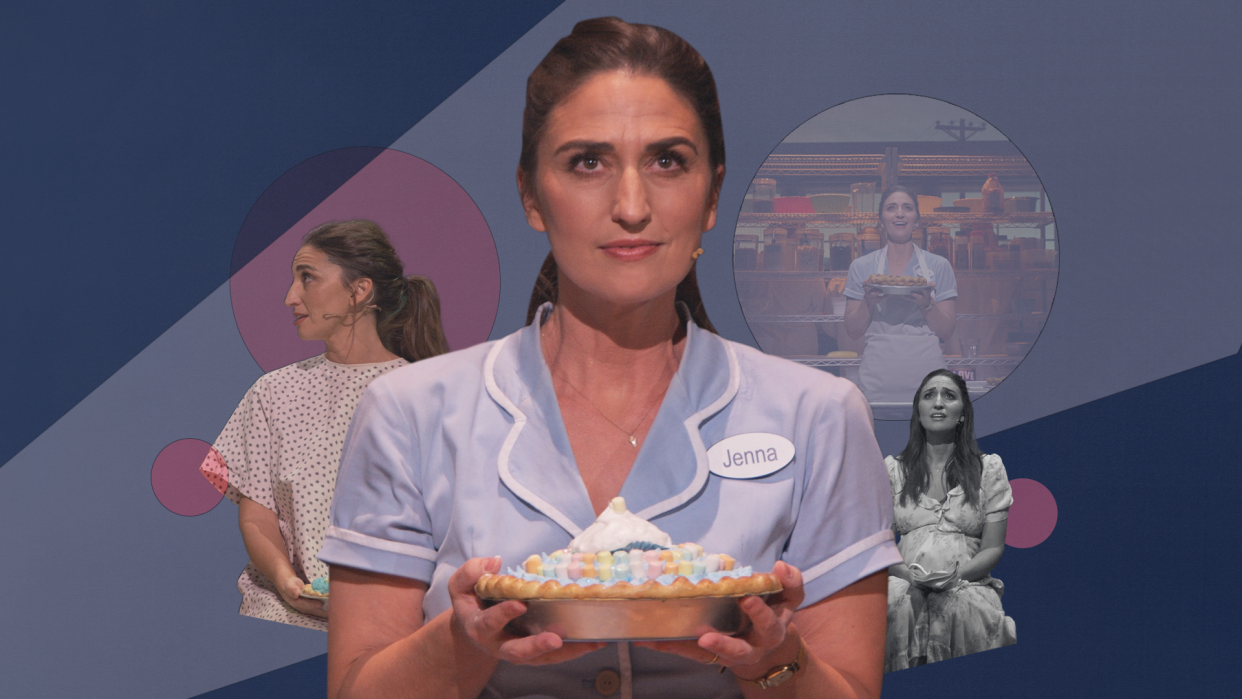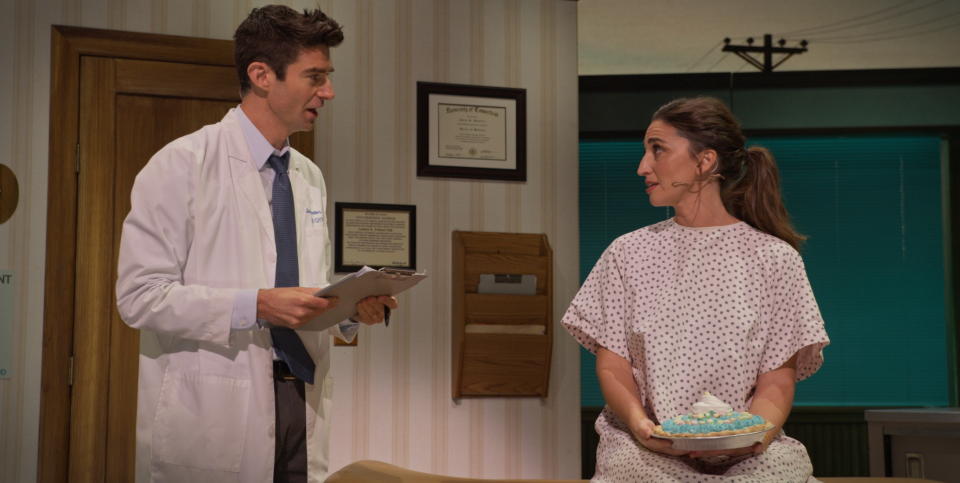Sara Bareilles on the ‘Stroke of Genius’ That Makes Waitress So Radical—And Enduring

- Oops!Something went wrong.Please try again later.
- Oops!Something went wrong.Please try again later.
Bleecker Street
Like a great baked good, Waitress is full of layers—some sweeter than others.
Few know that better than Sara Bareilles, who wrote the music and lyrics for the Broadway musical (and later took over the lead role of Jenna Hunterson from Jessie Mueller). Although the show played its final performance in December 2021, it's held a pie-shaped space in fans' hearts, which will finally be filled when Waitress: The Musical hits theaters nationwide on December 7.
The film is a taping of the live Broadway show, and, according to Bareilles, it “feels like a legitimate miracle” that the movie was made at all.
“I can't even tell you the karma of this show,” Bareilles tells Glamour over Zoom. “I feel like Adrienne Shelly is working the puppet strings from beyond.” (Shelly, who wrote, directed, and costarred in the original film, was killed in 2006 before its release.)
Waitress was one of the first Broadway shows to reopen after the pandemic, following an unprecedented shutdown that lasted nearly 18 months. “Within that reopening we were like, We've assembled this incredible cast, let's make sure we get a live capture,” Bareilles recalls. “I grew up in a really small town, and going to a theater show on Broadway in New York City was just not a possibility,” she says, adding that the film feels like a “beautiful proxy” for those who couldn't experience the show IRL.
Beyond that, Bareilles is excited to share this story. Like one particular pie described in the show, the ingredients are familiar—romance, friendship, family, nostalgia—but they're mixed together in a way you wouldn't necessarily expect.
“It's really incredible to see the tableau at the end of the show is not a romantic one,” she says, before correcting herself. “I mean, it is a romantic one; it's the great love of friendship, which I think is so often kind of like a second-tier love story. For me, some of the greatest loves of my life are my close friends.”
In a candid conversation with Glamour, Bareilles shares more about the upcoming film, including why the message is so salient today.
Glamour: What were some of the biggest changes in the filmed version? I noticed there’s a real, live baby.
Sara Bareilles: Overall, we really made great efforts to keep it [the same]. There were discussions: Where does it need to be edited differently? Do we need to lose certain things? And we were all feeling like we really want to preserve what is happening inside those four walls.
The addition of the baby was an incredible stroke of genius in my opinion, from our director Diane. It made it so emotional. She was, I want to say, two months old. You can shoot a baby for 20 minutes. That's it. The baby started out kind of calm and then she got kind of fussy, and I was singing over her crying. But endowing that moment with the reality of a real, live little girl was so deep and so profound and really made the stakes of this moment come to life so beautifully.
What’s your favorite moment to perform in the show?
One of my favorite moments is “Soft Place to Land,” which is where the three waitresses are in the pantry and they're singing three-part harmony. That song is so dreamy to me, and in the writing of it, it felt very conjured rather than created. I also have a background in choir singing and a cappella singing, so singing tight harmonies and especially three-part harmony—I used to sing with my sisters around the fire—there's something that feels really resonant about the sisterhood. That theme of the show feels so present in that scene.
And I really love singing “She Used to Be Mine.” Especially when I get to be onstage with Joe Tippett, who's my real-life partner, it's very emotional, it's very truthful. And that song is such an important part of Jenna's journey, so that always feels like I sort of relish that time onstage too.
Rewinding a little, some people might not remember that you actually weren’t the original Jenna onstage. Was it surreal stepping into that role?
Yes, very much so. Our original cast member is an extraordinary actress, Jessie Mueller, who's Tony-nominated for this role and for many other things as well. When I started working on this project, I had done community theater as a kid, but this was my first time back into the theater space. It did not even cross my mind to imagine being in the show, and the idea of writing this show felt like this impossible mountain to climb. But when Jessie finished her run and was getting ready to leave the show, I just felt this part of me sit forward and I could feel that I really wanted to try.
By that time, we’re six years into the development of the show. The people onstage are some of my closest friends, the crew, the band. It is a legitimate family at this point. And I was at the theater all the time, and I was like, Could I possibly? And I was scared shitless, and I was kind of like a deer in headlights on that first night. But yeah, I've learned so much and even stepping into the show has brought out this whole other side of what Waitress has brought to my life. It's just changed everything for the better.

The show isn’t outwardly political, but there are these themes of regaining power and stepping into your own as a woman. Do you feel like that is especially prescient right now?
Absolutely. Oh my God, yes. I think it's one of the strokes of genius of Adrienne Shelly is that she managed to make this very feminine, sort of radical film, but not hit you over the head with any of it. It really toes the line. And I think sometimes that is a great service to an audience because when people aren't feeling [defensive], they can stay open to the ideas.
In my interpretation, this is really a movie about choice. It's a movie about a woman who is deciding to keep this pregnancy that she doesn't want, not because she doesn't understand that there are other options, but because she's making this decision. And it's a hard decision. But I love that [Shelly] chose to have her dump the doctor in the end and stand on her own two feet and be a single mother and do it with as much joy and resiliency and her community standing by her side.
We added a line in the doctor scene that was always very important to us, that we weren't judging abortion. This is [about] wanting to carve out space for women to feel independent and to feel ownership of their own bodies, which I feel very firm about.
Could you envision there ever being a fully staged version of the musical in a movie like we're seeing now with Mean Girls?
I never say never. Certainly I think I could see that happening at some point. There's no discussion of it at the moment. It was such a heavy lift to get this version up and running, so I feel excited that we at least have this.
Shifting gears a little bit, I really appreciated your posts a few weeks ago about beauty standards. What prompted you to speak about that to your followers?
I've done a lot of introspection over the last few years. I'm prone to anxiety and depression. And then in the pandemic I really hit a fucking low, and I got on medication for the first time, which was a total lifesaving and changing, [and] cannot-believe-I-didn't-try-it-sooner. It has been so deeply helpful and such a saving grace. But I was very resistant. But in these last handful of years, I've done a lot of work on trying to understand where some of my patterns have come from, and I could feel myself, as I'm going back into a press cycle and being in front of people and dressing up and taking pictures and being on TV, and I could feel my anxiety spiking.
For the first time, I think honestly, with the help of both meditation and medication, there's more spaciousness in my brain to see…the gears turning. And some of it is just rage at what women—and I don't want to be exclusive, it's not just women, it's certainly people across the spectrum of gender—but it feels like we have been taught to try and hide that we're aging from everybody. It's a very cruel place to be inside yourself, because it is an essential truth of how life works, and we're almost being asked to deny it.
So the stress of trying to conceal this completely natural evolution and this natural stage is just fucked up. And I have good days and I have bad days. I certainly was having a bad day when I was posting on Instagram…. So it's not easy, but I'm trying to embrace aging. And there are days where I don't want to fucking look at my face and I don't want to look at my body. And I'm trying to be honest about the fact that it's not one way or the other. It is always both. But I'm trying to, at least at this moment, embrace the fact I'm turning 44 in a few days and I don't want to tell myself that I need to be something different. I can't say that those feelings aren't still there, but I'm really trying to actively work with that. And I want to talk about it because it makes me feel better.
This interview has been lightly edited and condensed for length and clarity.
Originally Appeared on Glamour

